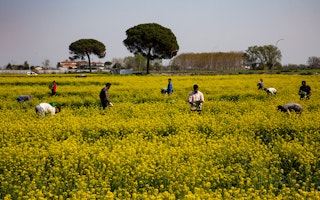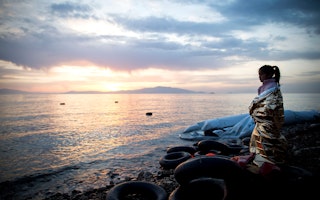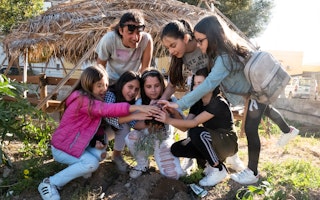Making Sure No One Is Lost in Translation
By Dragan Kremer

Upon reaching Serbia these days, among the first people a refugee typically meets at a reception center is an interpreter, their guide through the early steps of what can be a harrowing process. From helping refugees access water, food, and medical care to assisting them as they try to locate family members, the interpreter’s job bridges the practical and the personal.
Since the early stages of the inflow of refugees, Open Society Foundation Serbia has supported interpreting services, especially in non-European languages largely used by refugees. Many of these interpreters find that their own life stories have become entwined with those of the people on the move. Here we present a view of Europe’s refugee influx from four interpreters’ unique perspectives.
“We Had Given Up All Hope”
Tomas Valter is orthodox Christian Assyrian, an ancient minority in Iraq whose members usually migrate to Austria, Germany, Australia, or nearby Syria. In 1968, after high school, Tomas left his home in Basra to study medicine in Yugoslavia. Since then, he has worked in Bosnia and Serbia. His sons are both physicians; he himself retired last year.
Valter’s native Arabic suddenly became useful again a few months ago. “Initially it was just an hour or two a day, but it soon escalated,” he says, referring to the number of refugees he worked with. “Every day is different. Sometimes we have 1,500 people in a camp for 200. I’m meeting Syrians mostly—more than 70 percent of them—then Iraqis and Afghans. Often I’m taking care of their minor injuries while interpreting.”
“I met a dentist from Syria, wounded there, both his sons killed. He was carrying his medical diploma, obtained decades ago in Romania not too far from here. And there are events even harder to believe. A young woman from Syria, eight months pregnant, arrived here with her husband and their little daughter.
“Unfortunately, she tried to run across a local road and was hit by a car—lots of fractures, serious internal wounds. She lost the baby, and for days was in a coma. We had all given up hope, and the husband and daughter proceeded to Sweden as they had initially planned. But a few days later the woman woke up and started recovering. I was so happy to be part of the search to locate her family in Sweden. Soon she will be well enough to be transported there.”
“I Understand These People”
On the outskirts of Belgrade, in Krnjača, a refugee camp has somehow survived from the 1990s, when Serbia took in more than 400,000 refugees and internally displaced people during a decade of civil wars that tore Yugoslavia apart. For a year now, Rima Aboughazale has been fully engaged in that camp.
Born to a Lebanese father in Belgrade, then the capital of Yugoslavia, her family moved to her father’s homeland when Rima was three years old. Her childhood was interrupted halfway through elementary school, when they fled war-torn Beirut and returned to Belgrade. Rima went on to study mining engineering and graduated as a geologist. When she couldn’t find a job in that field, she became an Arabic language interpreter.
“Syria borders Lebanon, so I know the country and the culture. After the Lebanon War, I was going there while visiting my dad’s family,” she says. “I understand these people, their urge to tell you, to confess about broken families, destroyed homes—losing the property and everything they ever had.
“They praise our people here in Serbia, feel the likeness of souls. They’re happy here, but they have to move on, go further. They see we’re a poor country, but a nice one—green! Since most of them arrived in spring and summer, originally from desert-like parts, I think they were overwhelmed with everything being so green and in full bloom.”
“You Could Feel Their Desperation”
Soheil Tohidi arrived in Yugoslavia from Iran 26 years ago with plans to become a dentist and return to his homeland. He instead ended up settling down in the Serbian city of Novi Sad. Earlier this summer, with the influx of refugees increasing, Soheil began volunteering as a Farsi translator. He has hardly stopped since.
“We need the facts, but you can’t avoid hearing their stories about being robbed, and frequently about the horror they lived through in small boats set out from Turkey towards Greece. Then there are those afraid of being arrested, so occasionally we’re going through the woods on foot, calling out, approaching families and small groups ….
“The worst moments were the violent incidents—clashes with Hungarian border police at Horgosz. You could feel their desperation, their disorientation, being totally exhausted …. And there are the impressive moments, like when I was summoned to a young woman who had fainted. It was very sensitive to get her to accept the doctor’s examination. It turned out she was pregnant without being aware of it.”
“This Was the Closest I Got to Genuine Panicking”
Safaa Alobaidi, known as Saf, also comes from Iraq. He arrived in Serbia via Syria eight years ago. Proud of his two university degrees in horticulture and civil engineering, he ended up living in an asylum center in Banja Koviljača, one of the oldest spas in Serbia.
On the western border, towards Bosnia and Herzegovina, the center was opened in 1965 and served exiles from South America and Eastern Europe until 1991, later to become dedicated to refugees from Croatia and Bosnia. Since 2007, it has operated under the auspices of the UN’s refugee agency, UNHCR.
After helping his fellows in the center, two years ago Saf started translating English into Arabic for UNHCR officials. A former asylum seeker himself, he was nevertheless terrified on a trip to Kanjiza, where he worked with the Red Cross at the blocked crossing points into Hungary. “We were dealing with hundreds in Banja Koviljača,” he says. “But approaching the border [of Hungary], we found ourselves among tens of thousands of people, everybody at the end of their nerves, no patience left. This was the closest I got to genuine panicking.”
Dragan Kremer is media program coordinator at Open Society Foundation Serbia.


